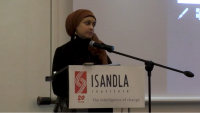CAPE TOWN: On the 12th and 13th of June, the Isandla Institute held a national conference in the City of Cape Town on ‘Urban Citizenship as a Verb: Facilitating Action Through Coalitions for Change’. The conference focused on the relationship between the residents of a city and the spaces in which they live, work and socialise.
Urban citizenship is about both the political belonging associated with rights and formal recognition, and the enjoyment of rights and opportunities as well as political participation.
South Africa remains a state where many have been permanently displaced due to forced migration, the creation of labour reserves (later rebranded as ‘Homelands’) and the migrant labour system. The loss of land, both economically and spiritually, remains a haunting legacy of Apartheid. In many conversations and debates surrounding the land question, urban land is often excluded from consideration.
In her keynote address, the Nelson Mandela Foundation's Dialogue Analyst, Sumaya Hendricks, reflected on the need to actively involve the community members whose lives are affected by the urban land debate.
Hendricks noted that many policy-making discussions suggest that the solution to the land debate is to register title deeds for people living on rural land in the old Bantustans. This approach, she argues, unintendedly vindicates the legacy of the economic and social exclusion of historically internally displaced black people.
“The suggestion that the densification of suburban space would leave black people feeling alienated ignores the profound sense of alienation black people experience living on barren land, in slums and townships in our dual, Apartheid, spatial planning” says Hendricks.
As the conference came to a close, it became apparent that we need to work collaboratively across government and civil society, to consistently reflect on our methods and approaches to the many land questions we have as we negotiate and combat the legacy of our profoundly unjust and unequal past.
